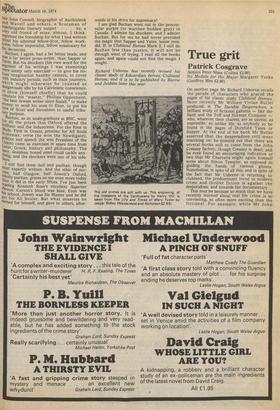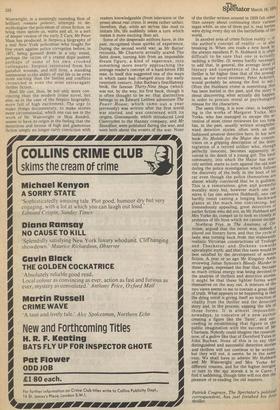True grit
Patrick Cosgrave
Serpico Peter Mass (Collins £3.00) No Medals for the Major Margaret Yorke (Geoffrey Bles £2.40) On another page Mr Richard Usborne recalls the parade of characters who graced the pages of his classic study Clubland Heroes. More recently Mr William Vivian Butler produced, in The Durable Desperadoes, a brilliant study of fictional gallants — like the . Saint and the Toff and Norman Conquest — who, whatever their charms, are as unreal, as impossible, as unlike life, as anybody to be found in the pages of Dornford Yates or Sapper. At the end of his book Mr Butler asserted that the desperadoes still went marching on: he pointed out that there are several books still to come from the John Creasey factory, though Creasey is dead; and he even found an encouraging indication or two that Mr Charteris might again himself write about Simon Templar, as opposed to guiding the hands of various ghosts. Nonetheless, in spite of all this, and in spite of the fact that Mr Usborne is returning to clubland, the predominant trend in modern crime and thriller fiction is against the desperadoes, and towards the documentary.
This may be because so much that we have recently learned about real life crime is so convincing, so often more exciting than the fictional. For example, while Mr John
Wainwright, in a seemingly unending flow of brilliant romans policier, attempts to demythologise the policemen of crime fiction, to bring them before us, warts and all, in a sort of deeper version of the early Z Cars, Mr Peter Mass has produced, in Serpico, a biography of a real New York policeman who fought for five years against police corruption before, in 1971, being gunned down in a city street, perhaps the victim of a crazed dope pusher, perhaps of some of his own crooked colleagues. Serpico recovered from his gunshot wounds, and still lives, a standing testimonial to the ability of real life to be even more exciting than the battles and conflicts chronicled in even the most extravagant thriller fiction.
Real life can, thus, be not only more convincing than the modern crime novel, but also, as in the case of the Serpico biography, more full of high excitement. The urge to make things documentary, to make stories more circumstantial, which one can see in the work of Mr Wainwright or Miss Rendell, seems to have its origin in the feeling that the detectives and heroes of high and glamorous fiction simply no longer carry conviction with readers knowledgeable (from television or the press) about real crime. It seems rather unfair, therefore, that, while art strives like mad to imitate life, life suddenly takes a turn which makes it more exciting than art.
Some of the desperado authors have, in the past, recognised these quirks of experience. During the second world war, as Mr Butler recounts, Mr Charteris actually scaled The Saint down, turning him from an impossible dream figure, a kind of superman, into something more nearly approaching the average reader's concept of a hard-bitten FBI man. In itself this suggested one of the ways in which taste had changed since the early twentieth century. John Buchan's first Hannay book, the famous Thirty-Nine Steps (which was not, by the way, his first book, though it is often thought to be so: that distinction belongs to an Edward Leithen adventure The Power House, which came out a year previously) was written after the first world war started, and was concerned with its Greenmantle, which introduced Lord Clanroyden to the Hannay company, and Mr Standfast, were published during the war, and were both about the events of the war. None
of the thriller writers around in 1939 felt other than uneasy about continuing their various sagas while, as one of them put it, real heroes were dying every day on the battlefields of the world.
In another area of crime fiction reality — or the author's concept of reality — is also breaking in. When one reads a new book bY the always excellent P. N. Hubbard it is often difficult to be sure that one is actually tackling a thriller. (It seems hardly necessarY to add that, in general, the average level of literacy and competence of the average thriller is far higher than that of the average novel, as our novel reviewer, Peter Ackroyd, would probably be among the first to say.) Often the Hubbard crime is something that has been buried in the past, and the story is about discovering what actually did happen. in order to procure moral or psychological release for the characters.
The same thing, it is now clear, is happen ing in the works of Margaret Yorke. Mrs Yorke, who has managed to escape the attention of most crime reviewers for too long, has, in the past, usually written straightforward detective stories, often with an oldfashioned amateur detective hero. In her new book No Medals for the Major she concentrates on a gripping description of the disintegration of a retired soldier who, though perfectly innocent, becomes apparently involved in the death of a young girl. The local community, into which the Major has scarcely settled, starts to turn against the old man during the police investigation which follows the discovery of the body in the boot of his car even though the police themselves are almost wholly convinced that he is guiltless. This is a remorseless, grim and powerful morality story but, however ankh one admires it (as one admires Hubbard), one can hardly resist casting a longing backward glance at the much less convincing, but tremendously appealing, great detectives of earlier fiction who did not, as Mr Hubbard and Mrs Yorke do, compel us to look so closely at problems of life from which we cannot escape. Northrop Frye, in The Anatomy of Criticism, argued that the novel was, indeed, a played out literary form, and that the cycle of taste was turning back from the elaboratelY realistic Victorian constructions of Trollope and Thackeray and Dickens towards apocalyptic myth; and that this taste would be best satisfied by the development of science fiction. A year or so ago Mr Kingsley Amis, reviewing Julian Symons's Bloody Murder in these pages, expressed the fear that, because so much critical energy was being devoted to the analysis of thrillers and detective stories, it might be that these lighter forms were themselves on the way out. A mixture of the two views seems to me to contain a great deal of truth. What appears to be happening is that the dying novel is giving itself an injection of vitality from the thriller and the detective story and, in the process, sapping the life of those forms. It is almost impossible. nowadays, to conceive of a new author creating a figure like the 'Saint', and succeeding in establishing that figure in the public imagination with the success of Mr Charteris. Nobody could imagine the creation, now, of a galere like that of Dornford Yates or John Buchan. None of this is to say that distinguished and successful detective stories and thrillers will not continue to be written, but they will not, it seems, be in the same vein. We shall have to admire Mr Hubbard and Mr Wainwright and Mrs Yorke for different reasons, and for the higher intrigue to turn to the spy stories a la le Carre. , find it saddening, though time will not dim the pleasure of re-reading the old masters.
Patrick Cosgrove, The Spectator's political correspondent, has just finished his first thriller.



































 Previous page
Previous page